Election 2015: Is there really such a thing as 'the women's vote'?
- Published
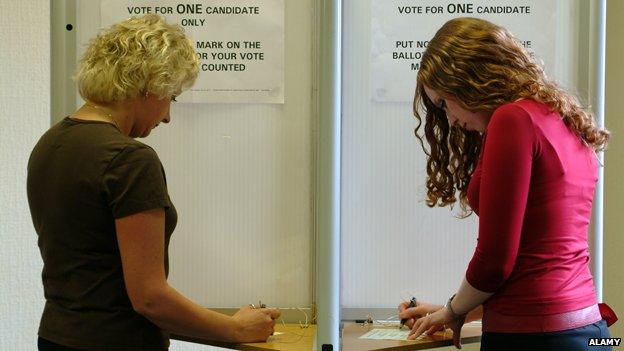
UK politicians are pulling out the stops to attract "the women's vote". But is it really possible to lump all female voters together?
It's a given of British politics that candidates always say they are targeting the female vote.
Last time around, 2010 was dubbed "the Mumsnet election, external". In 1997, "Worcester Woman" was identified as a key target voter. This year, Labour's controversial pink minibus - intended to help the party connect with women - has been the subject of much attention and ridicule.
In some ways, the strategy seems like a no-brainer - women make up 52% of the British electorate. So potentially they have a bigger say in who forms the next government.
But it's stating the obvious that all women are different. And women are as likely to vote as differently to each other as men are. There are some who would regard the term "women's vote" as patronising and offensive.
No-one, after all, talks about "the men's vote".
But do women really vote differently to men? And if so, could women play a key role in deciding who wins this election?
There is no definitive data or straightforward sex gap in how men and women vote, but Dr Rosie Campbell, a gender and politics expert at Birkbeck University of London, says the two sexes do approach politics differently.

Worcester Woman
Political buzzword popularised by pollsters in the mid-1990s
Signifies a particular type of voter - woman of modest means in her 30s with children, who is concerned about social issues but has little interest in politics
"Worcester woman" was thought to be the type of swing voter most likely to swing from Conservative to Labour in the 1997 general election

"If you ask people whether something is important, you don't see much difference between men and women. But if you ask them to identify the most important issue facing Britain, women are more likely to say health and education, whereas men are more likely to say taxation, the economy and Europe," she says.
Polls also consistently suggest women make up their mind later than men, with one survey suggesting women are twice as likely, external as men to still be undecided voters.
That makes women prime fodder for politicians in the final countdown to an election.
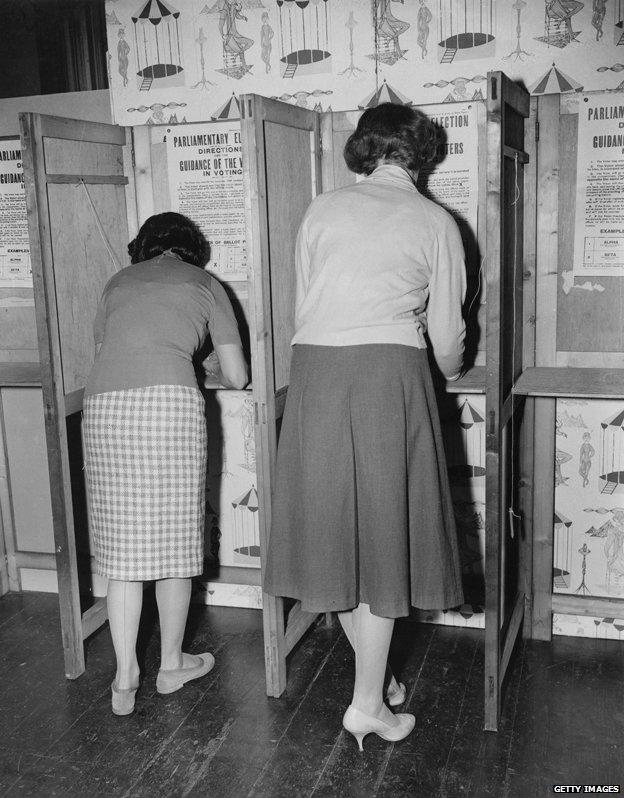
When it comes to support for the main political parties, Dr Campbell says women are "somewhat less likely" to be strong partisans than men.
There are some patterns. Women are still slightly more likely to vote Conservative than Labour, but that is probably partly down to the fact that women live longer than men, and older voters are more likely to be Tories.
Slightly more women vote for the Green party as well, while considerably more men vote for the SNP, BNP and UKIP.
But women also tend to say they are less interested than men in politics, according to Dr Campbell.
In the pedestrian precinct of Worcester - home to the mythical Worcester Woman which some pollsters claimed was crucial to Tony Blair's election victory in 1997 - plenty of women seem to bear that out.
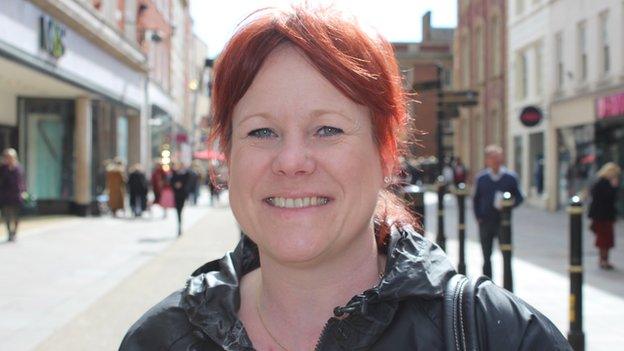
Susie thinks politicians just play point-scoring games
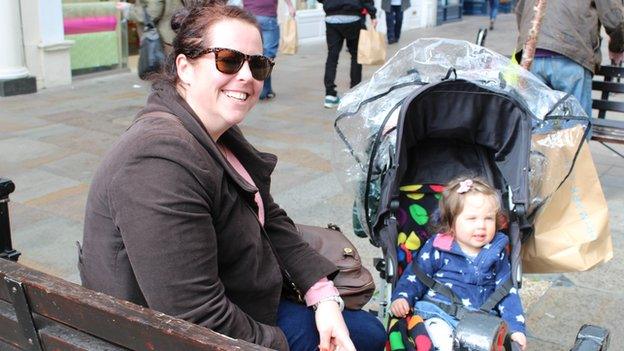
Mother-of-two Lydia Gardner would like more policies to be tailored towards women
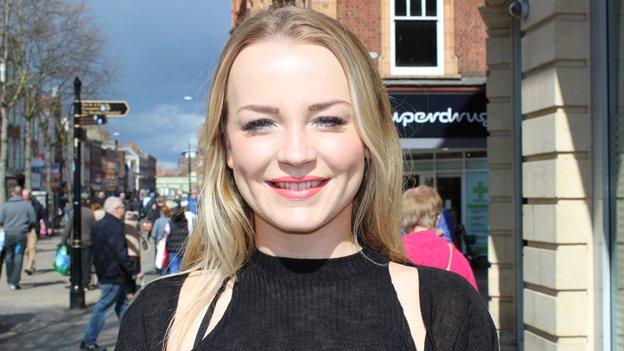
Catherine Sideway, 23, wants there to be more female MPs
Susie, 43, is put off by the political process. "Politicians just play games against each other, it's all point scoring party to party, which doesn't have anything to do with real people," she says.
Mother-of-two Lydia Gardner, 37, cares deeply about issues such as childcare and housing. But she also feels that politicians don't really relate to her.
"With women, I think they are are making it hard to go back to work. If politicians focused on issues like that, they would definitely get my vote," she says.
Catherine Sideway has another bugbear. The lack of women in Parliament.
"If there was a female MP who was good to listen to, it might make me more interested," she says.
The 23-year-old has a point. Since 1918, there have been a total of 370 female MPs. There were more male MPs in the 2010 House of Commons (502) than that.
However talk of a "turnout gap" or "millions of missing women voters" isn't justified, according to Dr Campbell. She says the 2010 British Election Study found a 1% gap, external between men and women, which isn't statistically significant.
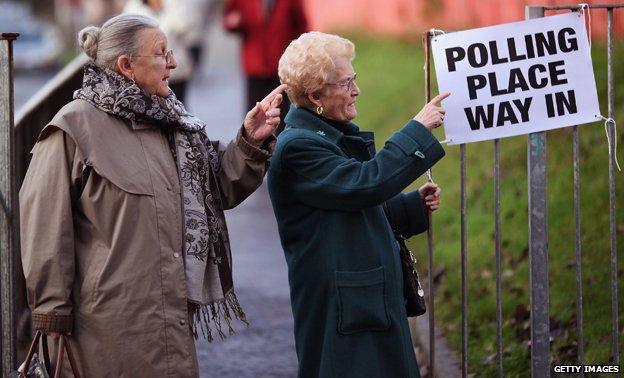
The idea that political parties can win over women isn't new. It's been around since women first got the vote in 1918.
The Conservatives were more canny initially, according to Steven Fielding, an expert in political history at the University of Nottingham.
"The party was better at speaking to women as housewives and carers, but also as consumers. Research shows if women hadn't had the vote, there would have been no Conservative governments between 1945 and 1979," he says.
Labour's focus was on the male-dominated trade unions, and it took the party a while to catch up with women's changing identities and realities.
"Labour introduced the Equal Pay Act in the 1970s, but it wasn't until the 1990s that New Labour brought women to the foreground in the election and made a big play for women MPs," he says.

A potted history of women in British politics
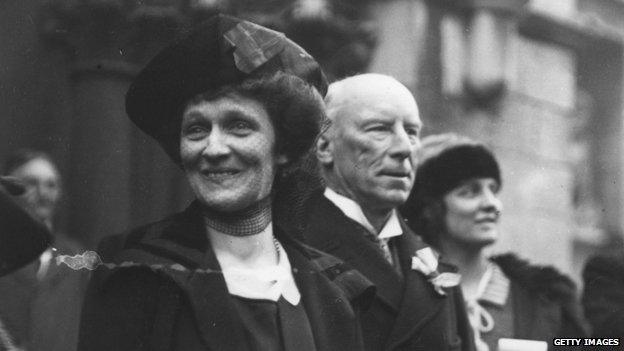
In 1918, the Representation of the People Act 1918 enabled women over the age of 30 who met minimum property qualifications to vote
Nancy Astor (pictured) became the first woman to take her seat in Parliament in 1919
The Equal Franchise Act gave women equal voting rights to men in 1928
The first woman in the House of Lords was appointed in 1958
In 2010, 143 of the 650 MPs elected to the Commons were women (22%)
Since 1918, there have been a total of 370 women MPs

The language politicians and the media use in relation to female voters has often had sexist overtones, says David Jarvis, a historian of 20th Century conservatism at the University of Cambridge. "Phrases like 'wooing' or 'courting' women, romantic language, the type of language girls' mothers warn their children that bad men will seduce vulnerable women with, is regularly employed," he says.
But Dr Jarvis believes any attempts to target female voters were normally part of wider calculations or cultural trends.
"Politicians have shied away from a simplistic view. Gender isn't a primary source of political identity, but there is scope for politicians to be more receptive, or attractive to, parts of the demographic that may be affected by their gender. Party strategists think hardest about image and cultural fit," he says.
It is easy to see how some factors might affect how more women vote than men.
Childcare tends to fall to women more than men, at least when children are very young.
Women also make up 65% of the public payroll, according to the Labour Force Survey, and are slightly less supportive of spending cuts to public services than men, according to Dr Campbell.
"When it comes to hostility to the spending cuts, it varies depending on how the question is asked, but there is often about a 10% point difference between men and women, with women being more hostile to cuts in public spending than men, and I do think that is something that could manifest itself in this election," she says.
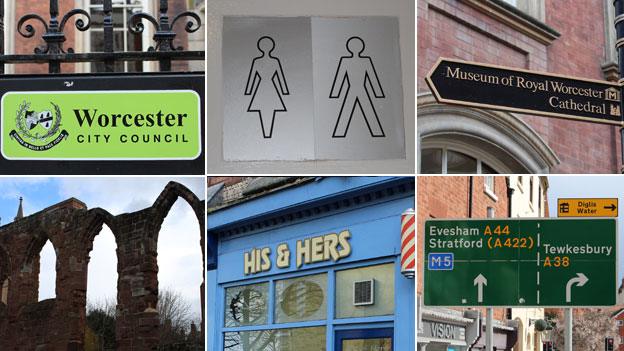
But could politicians do more to appeal to women in particular?
Back in Worcester, friends Beril Perks, 80, and Pat Gunster, 74, are quite happy with the status quo.
"I don't think so. Politicians get my vote on merit, not because they are targeting me as a female," says Beril. "MPs just need to do their job properly," agrees Pat.
However, Fran Fosh, who has run Charlie's cafe in the city for 29 years, thinks politicians should do more to promote gender equality.
"I've battled male-dominated banks for 30 years. I think, in general, men think this divide doesn't exist, whereas women know from experience there are problems along the way because of this male dominance. I'd back somebody who tried to see a woman's side of things," she says.
Subscribe to the BBC News Magazine's email newsletter, external to get articles sent to your inbox.